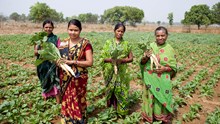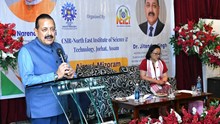
The enormous size and distinctive smell of the jackfruit make it a familiar sight in Indian and Southeast Asian tropical areas. Though everyone loves the soft, yellow bulb of the fruit, they end up throwing away the seeds hidden within. Look closer, though, these big, oval-shaped seeds are smooth, ivory-white to light brown, and around 2–4 cm long. They are hard and creamy when boiled, with a very mild, nutty taste that's rather pleasant.
Historically, they've been roasted or added to curries, but otherwise, they've mostly been overlooked. Nowadays, due to increased scientific attention, these seeds are turning out to be a lot more than kitchen waste.
Nutritional Treasure in a Simple Seed
Jackfruit seeds are nutrient-rich. They have 85% starch, 13–20% proteins, and are very rich in dietary fiber, iron, calcium, magnesium, and zinc. What is unique about them is that they are rich in antioxidants such as polyphenols and flavonoids that fight against inflammation and oxidative stress.
Unlike processed starches, jackfruit seed starch also has jacalin, a natural lectin that is beneficial for its antimicrobial action. This makes them a prospective ingredient for both food items and nutraceuticals, botanical supplements for health and immunity.
Functional Applications Beyond Food
What's so fascinating about jackfruit seeds is the way their starch and proteins can be modified using technology today. Through heat, acid, enzymes, or fermentation, researchers are now turning them into biodegradable films to pack foods, as stabilizers in soups and sauces, or even as drug delivery capsules.
They also have potential uses in environmental technology such as for wastewater treatment and the production of bioethanol which is a green fuel. This conversion not only decreases food loss but provides industries with a substitute for synthetic products, which is highly compatible with international goals on sustainability.
A New Economic Avenue for Farmers and Rural Youth
Jackfruit trees are found growing wild or already incorporated into home gardens in many rural villages. Encouraging seed harvesting, drying, and processing can allow communities to generate more money with minimal investment. Women self-help groups and young entrepreneurs are being encouraged to begin microenterprises based on jackfruit seed flour, snacks, or seed-based herbal products.
This cost-effective, high-potential venture can impart economic resilience to remote regions while promoting sustainable agro-based enterprises. It also provides an opportunity for India's natural farming movement with waste-free, resource-conserving agriculture at its core.
Jackfruit Seeds: Challenges and Solutions
In spite of the growing interest, mainstreaming jackfruit seeds comes with challenges. Uniform processing procedures have to be developed in order for food safety and product consistency. Farmers and consumers also lack awareness of the seed's maximum potential.
Policymakers and agricultural organizations must intervene for jackfruit seed-based enterprises through research, value-chain building, and market access. Training and capacity-building programs at the village level would help in ensuring extensive use and proper utilization.
Jackfruit seeds, once wasted, are now being welcomed for the potential they possess across industries. From providing nutrient-dense foods to providing green solutions and improving rural living standards, their possibilities are endless. In the seed of this ordinary fruit exists not only nutrition, but opportunity, innovation, and the path toward a healthier, greener world. By reframing what we discard, we sow the seeds of a more sustainable future.
















